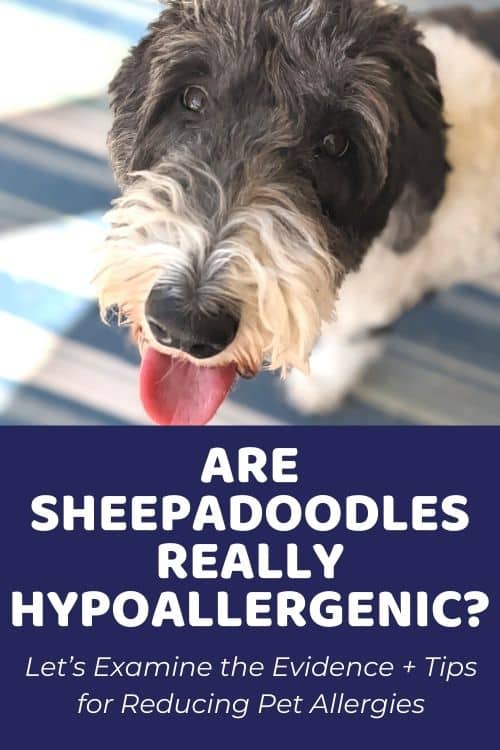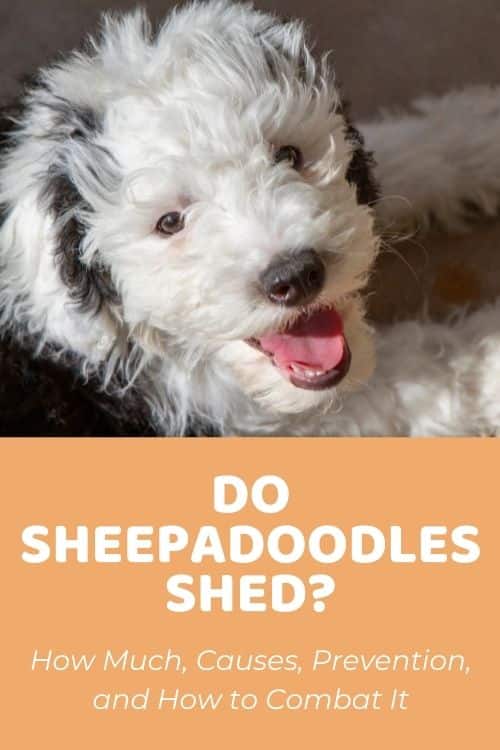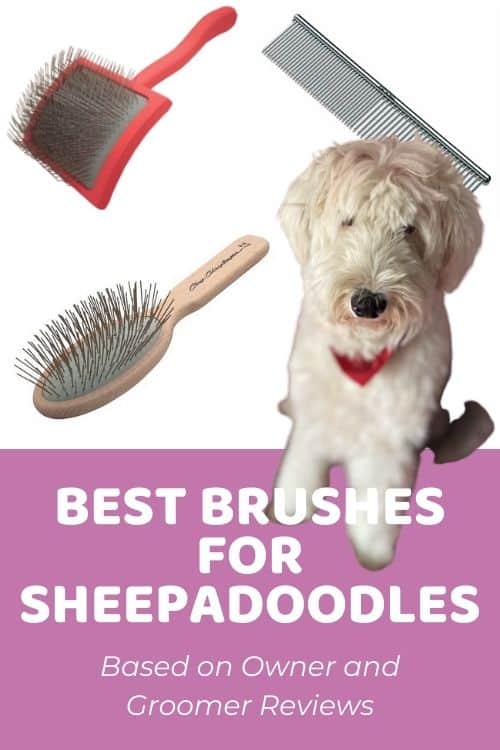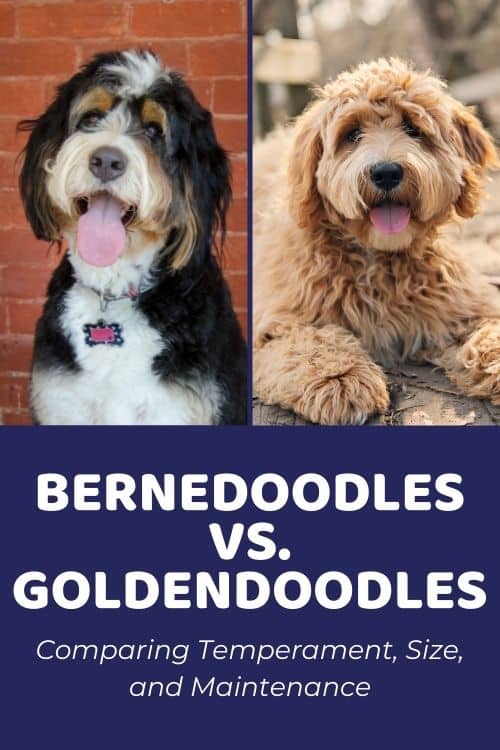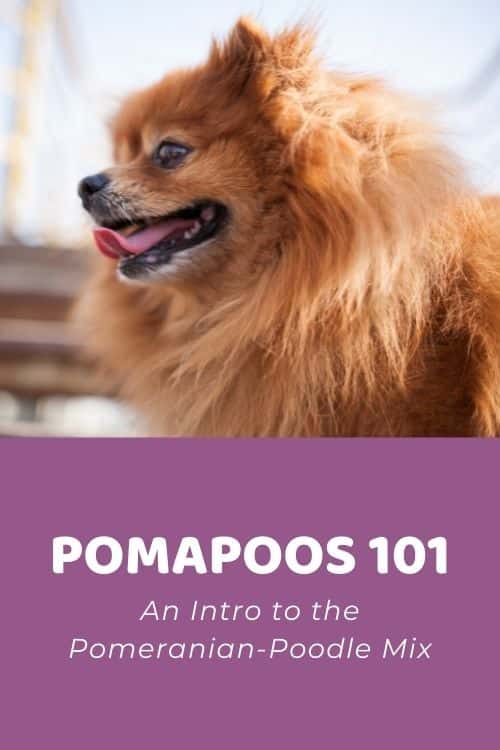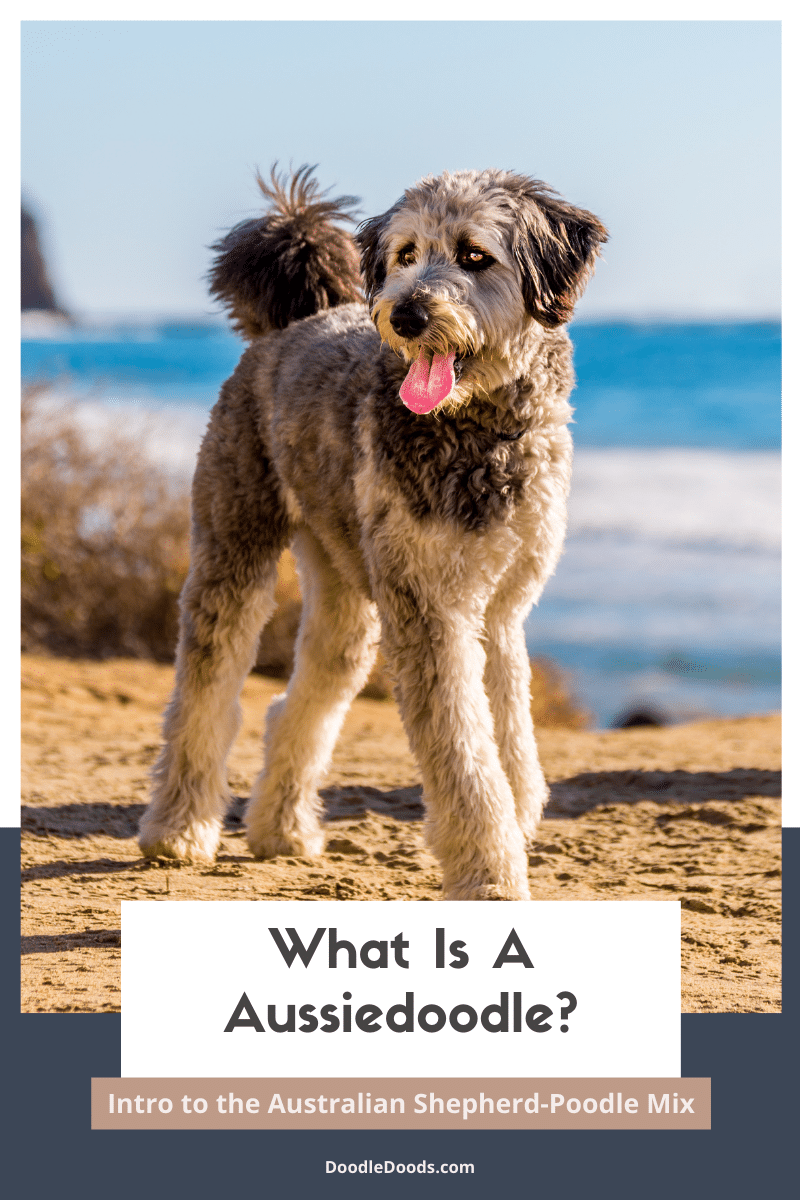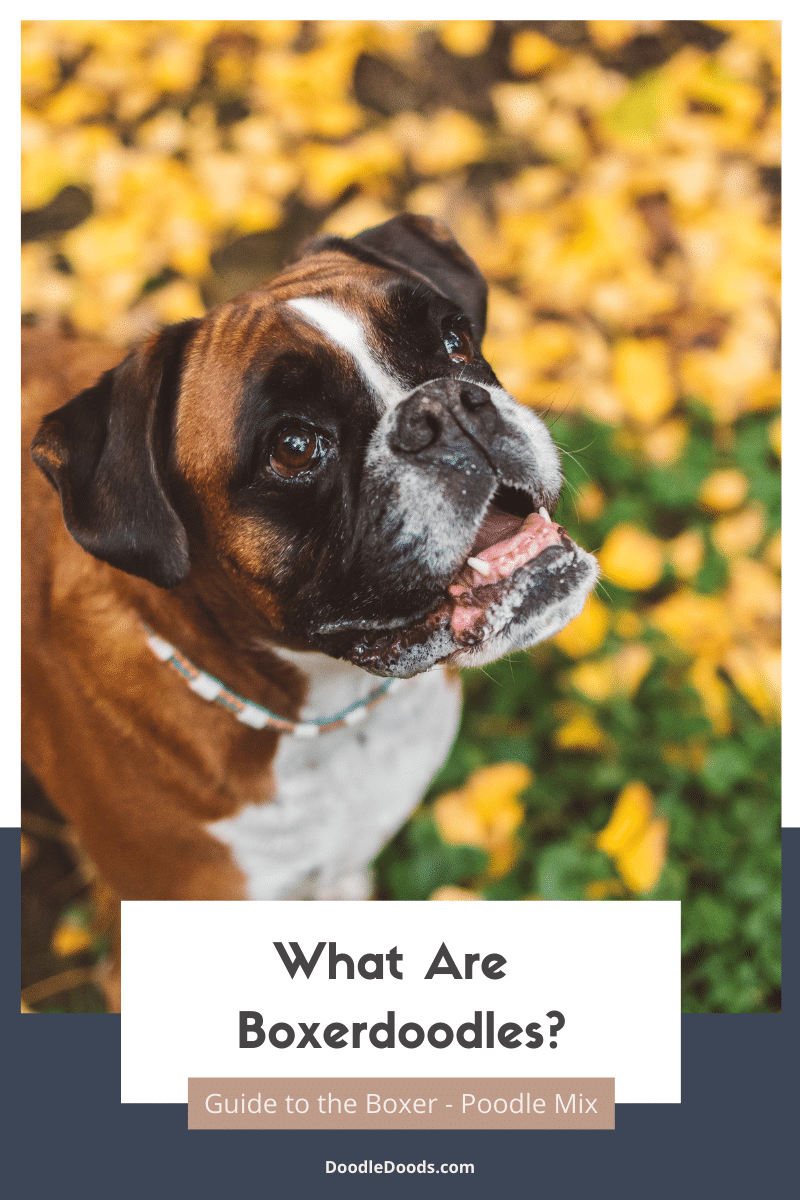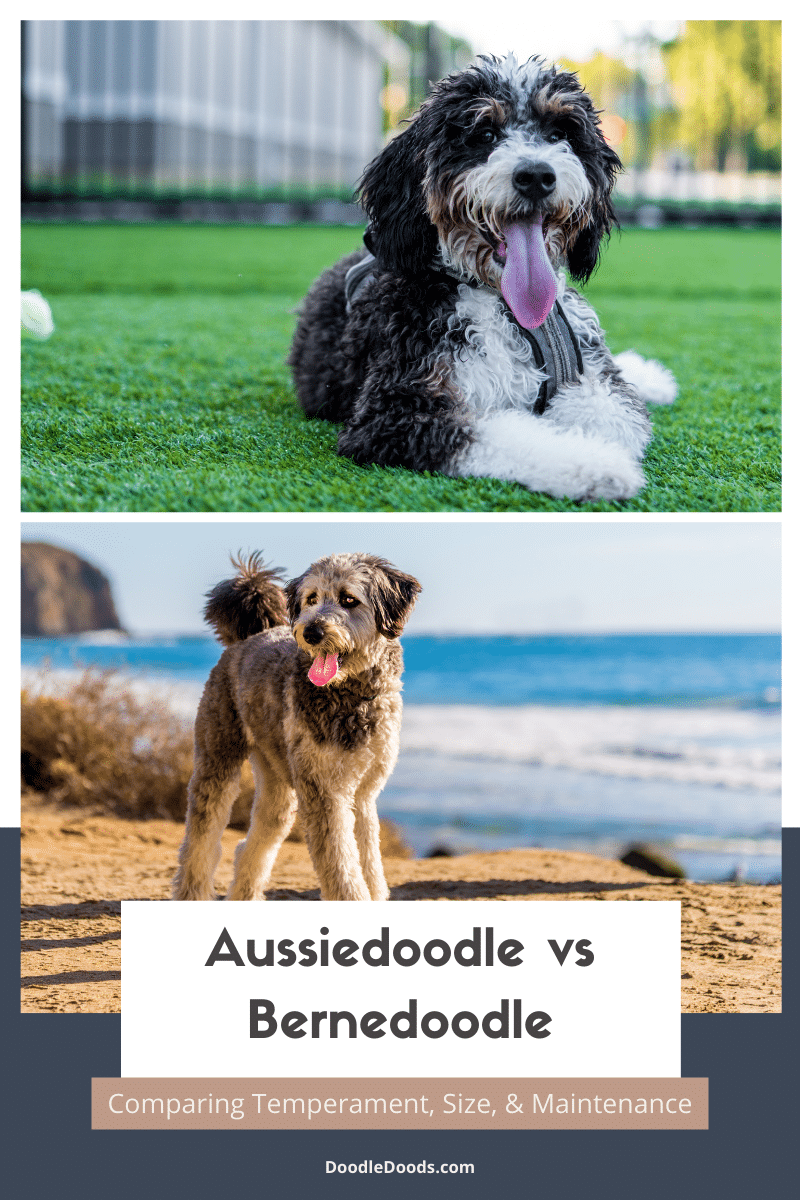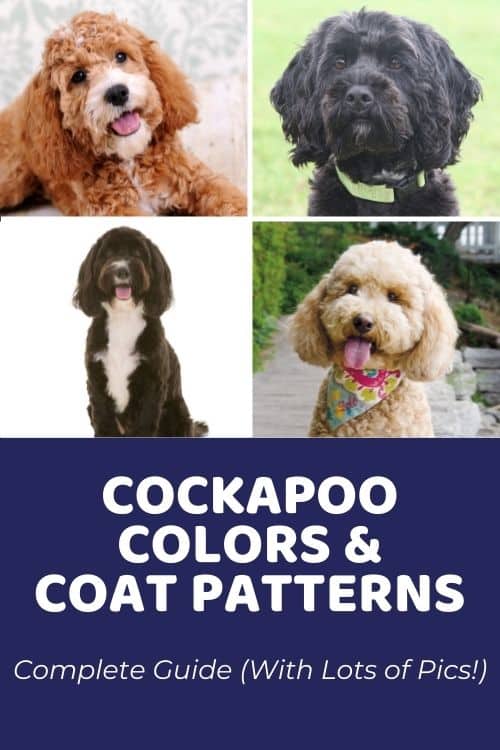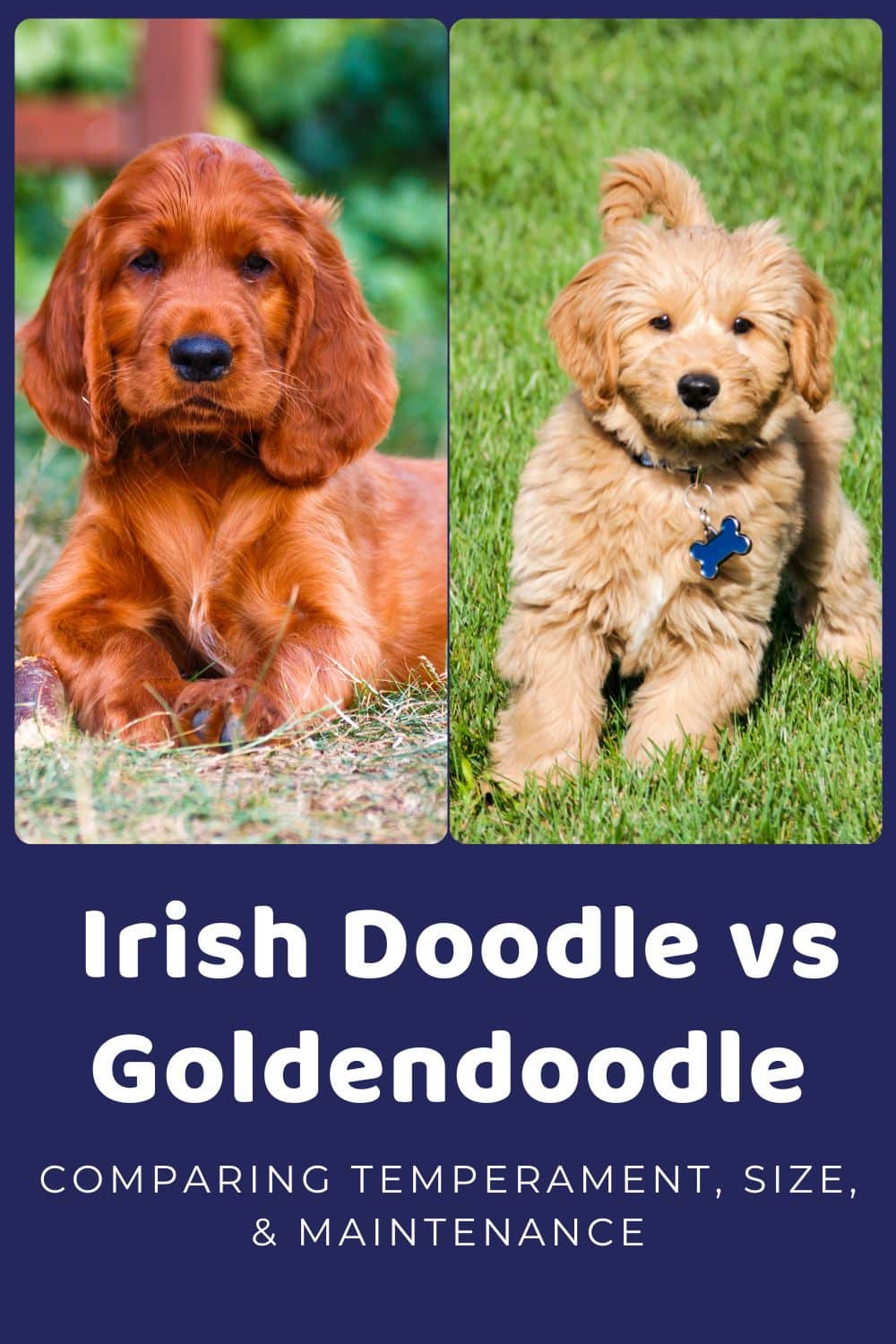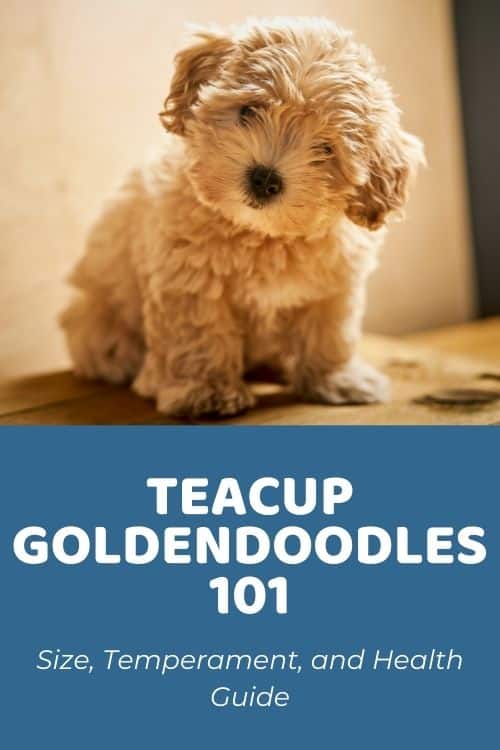Are Sheepadoodles hypoallergenic? For those of you who have allergies or are sensitive to fur-bearing animals, getting the answer to this question will ultimately help you in your decision to bring a Sheepadoodle home. Let’s dive in.
If you’ve got allergies, you’re probably super happy to hear about Doodles – the so-called ‘hypoallergenic dogs”. And it’s true, these pups were indeed created to be an allergy-friendly alternative to regular support and guide dogs. The original idea was to combine the service abilities of regular hounds such as Labrador Retrievers with that low-shedding Poodle coat for the best of both worlds.
These days the Doodle craze has extended beyond service dogs. The benefit of this is that most prospective pet parents with allergies can experience all the joys of dog ownership with none of the headaches, blocked sinuses, and frequent sneezing that they might get with regular dogs. However, some are concerned that not all Doodles live up to the hypoallergenic hype. Is this the case with Sheepadoodles? Let’s take a look.
Table of Contents
- Pet Allergies: What Are They and What Causes Them?
- The Great “Doodles Are Hypoallergenic” Debate
- So, What About Sheepadoodles?
- How to Have a Sheepadoodle and Enjoy Time With Them Too
- Are Sheepadoodles Hypoallergenic: Final Thoughts
Pet Allergies: What Are They and What Causes Them?
With somewhere between 15 and 30 percent of the population suffering from pet allergies, they really are a big deal. Thankfully cat allergies are, by far, the bigger problem, being about twice as common as dog allergies and much more severe. However, dog allergies can be problematic, too, especially if you adore dogs and would love nothing better than to adopt one.
Pet hair or fur is widely considered the biggest trigger for these allergies in people. However, this isn’t actually the case – or at least it’s only half the story. It is, in fact, proteins in dogs’ skin (dander) and saliva that causes the symptoms we refer to as allergies. Hair and fur shedding are just the way these are spread all about the place – the proteins’ best method of transportation.
What is actually happening is your immune system is reacting abnormally to these harmless proteins, acting as though they are a threat to your body. Your airways become inflamed, which brings on various symptoms – everything from nasal congestion to runny eyes and sneezing. If you have asthma, you’ll likely suffer the double whammy of difficulty breathing, chest tightness or pain, and trouble sleeping on top of all that. Not good.
The light at the end of the tunnel comes from the whispered rumor that dogs who shed less, or create less dander anyhow, might not be as much of a problem for people who do have allergies. The Poodle is known to be one of these dogs and, by extension, the Doodle too. Yet there is a little bit more to the story than that…
The Great “Doodles Are Hypoallergenic” Debate
Hypoallergenic, which refers to something less likely to cause an allergic reaction, is frequently used by breeders to describe their gorgeous Doodle puppies. However, it has been hotly contested whether this is indeed the case at all – which is why we are here now…
According to experts over at the American Kennel Club (AKC), there is no such thing as a completely hypoallergenic dog. However, they do go on to admit that some breeds are less likely to trigger an allergic response than others (namely those that shed less and produce less dander). With that in mind, the AKC lists 19 breeds as best for those with allergies. While the Poodle is numbered among them, the Old English Sheepdog, the other part of the Sheepadoodle equation, very definitely is not.
This is because the Old English Sheepdog’s glorious shaggy coat is not just long and luscious; it is also double-layered. What this means is that these dogs are shedders – and how! Beyond that, these dogs are also super droolers, which all adds up to plenty of those pesky proteins about the place. So is all hope lost for the allergy sufferer longing to adopt one of these beautiful pups? Perhaps not…
So, What About Sheepadoodles?
As we know by now, there is no such thing as a completely hypoallergenic dog. So, Sheepadoodles definitely can’t be referred to as such. We also know that two dogs go into the mix. While one of them is considered by experts to be hypoallergenic, the other is absolutely not. So are Sheepadoodles hypoallergenic or not? The answer likely lies in which generation of Doodles they belong to.
When we speak of generations in the Doodle world, we are looking at which kinds of dogs were the parents (pure or mixed breed) and, therefore, the different genes that have gone into the mix. For instance, Sheepadoodles can be any one of the following combinations:
| 1st Parent | 2nd Parent | % Old English Sheepdog* | % Poodle* | |
| F1 Sheepadoodle (first-generation) | Old English Sheepdog | Poodle | 50% | 50% |
| F1B Sheepadoodle (first-generation backcross) | F1 Sheepadoodle | Poodle | 25% | 75% |
| F1BB Sheepadoodle (first-generation backcross backcross) | F1B Sheepadoodle | Poodle | 12.5% | 87.5% |
| F2 Sheepadoodle (second-generation) | F1 Sheepadoodle | F1 Sheepadoodle | 50% | 50% |
| F2B Sheepadoodle (second-generation backcross) | F1 Sheepadoodle | F1B Sheepadoodle | 37.5% | 62.5% |
| F2B Sheepadoodle (alternate cross) | F2 Sheepadoodle | Poodle | 25% | 75% |
| F3 / Multigen Sheepadoodle | F1B Sheepadoodle or higher | F1B Sheepadoodle or higher | Varies | Varies |

As you can see, the Poodle genes vary in different generations. As it’s the Poodle genes that are responsible for that single-layered, low-shed coat, in theory, the more Poodle genes a Sheepadoodle has, the more likely it is they will be hypoallergenic. F1B, F1BB, F2B, and F2BB are better bets than the others.
However, genes are tricky things, and it’s not always easy to tell how they will be expressed. You could very well end up with an F2BB Sheepadoodle with an Old English Sheepdog coat. The best thing to do would be to chat with the breeder. They are the ones who know their dogs and the kind of puppies they usually produce.
How to Have a Sheepadoodle and Enjoy Time With Them Too
If you do manage to strike it lucky and land a Sheepadoodle with a low-shed coat, you need to remember that low-shed doesn’t mean no-shed. These dogs will still lose hair, which will carry dander about your home triggering your allergies once more. BUT…the good news is, there are certain things you can do to reduce this hair loss amount even further, or at least keep it contained and manageable, including:
Frequent Grooming and (Frequent-ish) Bathing
Removing dead hair and dry skin in as controlled a way as possible really is key. That’s why daily grooming is recommended for these dogs – that and the fact that those long, luscious locks they will inherit from either parent are very tangle-prone. Pick out a high-quality brush and schedule in regular trims, and you’ll be able to keep your pet’s coat in good order and confined to either them or the trash.
Washing your pup every six to eight weeks will help whisk away loose hair and, more importantly, any dander trapped in their coat. Be a little cautious with this, though. Cleaning your pup too frequently or with the wrong shampoo can dry out their skin, making it more likely to flake, and the situation will be even worse than before. Opt for a deeply hydrating shampoo and pay close attention to how their skin looks between washes.
Thorough and Regular House Cleaning
Even when you’re doing everything right, some hair will undoubtedly end up on your floor and furniture – that’s just the way it goes with pet ownership. Frequent vacuuming, sweeping, brushing down soft furnishing, and dusting will help quickly and efficiently deal with those issues. Wet wipes are excellent for picking up pet hairs and keeping them together for disposal.
Restricting your pooch to particular (more easily cleanable) areas of the house using dog gates might be a good idea to keep your workload down. You might also look into getting a High-Efficiency Particulate Air (HEPA) filter. These are said to be able to remove 99.97% of dust, pollen, mold, bacteria, and any airborne particles with a size of 0.3 microns.
Pick the Right Kind of Food
Poodles as a breed are very sensitive to certain ingredients that can often be found in dog foods. One of the side effects is dry, itchy, flaky skin that is more prone to shedding. This might also indicate that your four-legged friend is not getting sufficient nutrition from the formula you are currently feeding them. Dogs, like us, require quite a precise mix of proteins, fats, carbs, as well as vitamins and minerals.
Feeding your pal a top-quality food that is explicitly tailored for their size and specific nutritional needs is vital for their skin health and so much more. Don’t worry, though. There are plenty of great and affordable options available. These are the kibbles that we, and other owners, like for Sheepadoodles. They are packed full of tasty ingredients that contain everything your dog needs for a happy and healthy, long life.
Make Use of Supplements and Medications
If all else fails, you might turn to your vet about what might be causing your pooch to shed a little more than they should be. It might be that they can provide recommendations for certain supplements that could boost your pup’s hair health and help keep it firmly where it belongs. Omega oils and hemp oil is often great for this, but it’s wise to seek advice from the experts before including these in your pet’s diet.
It could also be the case that your dog’s shedding is just a bit more ramped up at certain times of the year. Canines naturally go through hair loss cycles and can shed a fair bit more when the temperature changes. If this is the way it is with your pet, then the only thing you can really do is keep well stocked up with nasal sprays and medicines such as antihistamines and bronchodilators that can help you survive these trying times.
Frequently Asked Questions About Sheepadoodles By Allergy Sufferers
Can you be allergic to Sheepadoodles?
People are not allergic to dogs per se, its rather that their body negatively responds to proteins found in dander and saliva that are easily spread when pups shed. With that in mind, it is possible to be allergic to Sheepadoodles, but that is more likely to be the case if they inherit an Old English Sheepdog coat which sheds far more than a Poodle one. It’s hard to know if this will be the case – breeders will likely know best.
Do Sheepadoodles shed much?
The rate at which a Sheepadoodle will shed is dependent on their genes and the coat they end up with. Sheepadoodles could get the low-shed single-layered Poodle coat, the double-layered heavy-shed Old English Sheepdog coat, or they could inherit hair that sits somewhere between the two. It’s tough to predict which coat your adult Sheepadoodle will have – although there are some key indicators such as generation.
Are F1B Sheepadoodles hypoallergenic?
F1B, F1BB, F2B, and F2BB all tend to have more Poodle genes than other Doodle varieties (depending on the parent used in the backcross). For this reason, they stand a greater chance of being hypoallergenic, but that is not always a given. Rather than assuming that these dogs won’t trigger your allergies, have a careful chat with the breeder. They are more likely to know the chances of their puppies inheriting a low-shed coat and might be able to furnish you with some kind of guarantee on that.
Are Sheepadoodles Hypoallergenic: Final Thoughts
Sheepadoodles are truly unique, gorgeous dogs. It’s no wonder so many people are looking to adopt them. However, if you have allergies, you’re probably wondering whether they are the dogs for you. This is actually tricky to know because these darling dogs have one parent considered hypoallergenic and one that is not, so finding a puppy with the right coat will require plenty of careful research. If you manage it, though, it will totally be worth the time and effort you put in to be able to welcome one of these smart, fun, loving, and loyal hounds into your life.
Learn How to Care for Your Doodle Puppy!

Perfect for first-time Doodle parents, get ALL your questions answered, including questions new Doodle parents don’t even think to ask.
Plus, get $700 worth of Bonus Materials for FREE, including:- Doodle Parenthood Community and Support Group ($190 value)
- Doodle Puppy Growth Tracker ($20 value)
- EMERGENCY Cheatsheet: When To Call The Vet Immediately ($50 value)
- HELP! Button ($145 value)
- And SO MUCH MORE!
The information on this page is for informational purposes only. It is not intended to be a substitute for qualified professional veterinary advice, diagnosis, or treatment. Always seek the advice of your veterinarian or other qualified animal health provider with any questions you may have.

